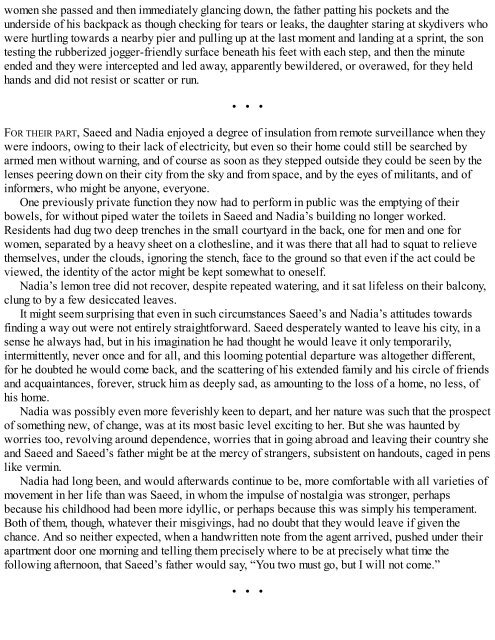Create successful ePaper yourself
Turn your PDF publications into a flip-book with our unique Google optimized e-Paper software.
women she passed and then immediately glancing down, the father patting his pockets and the<br />
underside of his backpack as though checking for tears or leaks, the daughter staring at skydivers who<br />
were hurtling towards a nearby pier and pulling up at the last moment and landing at a sprint, the son<br />
testing the rubberized jogger-friendly surface beneath his feet with each step, and then the minute<br />
ended and they were intercepted and led away, apparently bewildered, or overawed, for they held<br />
hands and did not resist or scatter or run.<br />
• • •<br />
FOR THEIR PART, Saeed and Nadia enjoyed a degree of insulation from remote surveillance when they<br />
were indoors, owing to their lack of electricity, but even so their home could still be searched by<br />
armed men without warning, and of course as soon as they stepped outside they could be seen by the<br />
lenses peering down on their city from the sky and from space, and by the eyes of militants, and of<br />
informers, who might be anyone, everyone.<br />
One previously private function they now had to perform in public was the emptying of their<br />
bowels, for without piped water the toilets in Saeed and Nadia’s building no longer worked.<br />
Residents had dug two deep trenches in the small courtyard in the back, one for men and one for<br />
women, separated by a heavy sheet on a clothesline, and it was there that all had to squat to relieve<br />
themselves, under the clouds, ignoring the stench, face to the ground so that even if the act could be<br />
viewed, the identity of the actor might be kept somewhat to oneself.<br />
Nadia’s lemon tree did not recover, despite repeated watering, and it sat lifeless on their balcony,<br />
clung to by a few desiccated leaves.<br />
It might seem surprising that even in such circumstances Saeed’s and Nadia’s attitudes towards<br />
finding a way out were not entirely straightforward. Saeed desperately wanted to leave his city, in a<br />
sense he always had, but in his imagination he had thought he would leave it only temporarily,<br />
intermittently, never once and for all, and this looming potential departure was altogether different,<br />
for he doubted he would come back, and the scattering of his extended family and his circle of friends<br />
and acquaintances, forever, struck him as deeply sad, as amounting to the loss of a home, no less, of<br />
his home.<br />
Nadia was possibly even more feverishly keen to depart, and her nature was such that the prospect<br />
of something new, of change, was at its most basic level exciting to her. But she was haunted by<br />
worries too, revolving around dependence, worries that in going abroad and leaving their country she<br />
and Saeed and Saeed’s father might be at the mercy of strangers, subsistent on handouts, caged in pens<br />
like vermin.<br />
Nadia had long been, and would afterwards continue to be, more comfortable with all varieties of<br />
movement in her life than was Saeed, in whom the impulse of nostalgia was stronger, perhaps<br />
because his childhood had been more idyllic, or perhaps because this was simply his temperament.<br />
Both of them, though, whatever their misgivings, had no doubt that they would leave if given the<br />
chance. And so neither expected, when a handwritten note from the agent arrived, pushed under their<br />
apartment door one morning and telling them precisely where to be at precisely what time the<br />
following afternoon, that Saeed’s father would say, “You two must go, but I will not come.”<br />
• • •
















